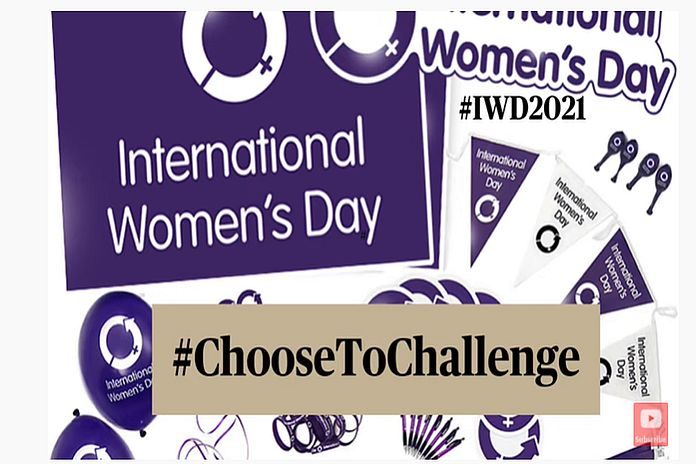By Earl Bousquet
International Women’s Day (IWD) has been observed globally since 1975; and covering them annually since, I’ve always lamented that the day’s message somehow always gets lost between the annual celebrations.
IWD was always celebrated with festivals, marathons and other events across the world, but COVID-19 forced 2021 observances to virtually all go virtual.
Challenge
One official IWD sub-theme this year is #ChooseToChallenge.
According to an article in USA Today (March 8, 2021) by Kaanita Iyer and Chelsey Cox: ‘A challenged world is an alert world… We can all choose to challenge and call out gender bias and inequality.
‘Gender parity in government, workplaces, health care, sports and media coverage is achievable through individual change…
‘[Women] hope this year’s theme… will inspire individuals to challenge biases, question stereotypes and celebrate the achievements of women around the world.
Frontline
There was also that other online announcement: ‘The global theme for International Women’s Day in 2021 is ‘Women in Leadership: Achieving an Equal Future in a COVID-19 World’.
‘COVID-19 has impacted women and girls in profound ways, amplifying the inequalities they face every day…’
I thought of combining the global and sub-themes for this 2021 IWD feature, as they cover the two cases I particularly wanted to highlight: Women being the majority of frontline COVID-19 soldiers to be saluted and the highest number of related deaths to be mourned, and revelation of an age-old problem some campaigners today call ‘Period Poverty’.
I opted to await the end of today to see just how much would be said the number of women who consciously sacrificed their lives – as volunteers – and paid the ultimate deadly cost(s).
The ‘Period Poverty’ stories I read were also inspired by COVID-19 – its effects on the reopening of schools in Europe – and the very belated realization that many students miss class due to cost and affordability of sanitary pads.
In the process, I learned that Scotland became the first place on earth – last November (2020) – to make sanitary pads free, not only in public schools but all public buildings.
The ‘poverty’ reports however urged attention to the plight of women and girls – in poor and developed countries – from families too poor to afford sanitary products.
It’s still unimaginable for too many Caribbean people that there could still (or ever) be anywhere in the world that ‘pads’ are simply not available, even unknown.
Fact is, though, everywhere in 2021 there are more women of all ages imperiled by the monthly affordability of personal sanitary upkeeps than might be imagined.
I raised the (‘Period Poverty’) issue with a couple of fellow men’, most of who said they were (in supposed effect) ‘put off’ by what one (politely and conveniently) described as ‘too bloody a topic…’
My fellowmen’s responses reminded me of some gentlemanly schoolmates I met (from time to time) pushing their wives’ supermarket trolleys on Sundays, who’d quiver and duck on hearing me asking aisle attendants for assistance to select ‘The correct pack of pads’ for my wife – ‘The one with wings’ (as instructed…)
(I would later receive calls about how much ‘embarrassment’ or ‘situation’ I caused between them and their wives…)
‘Sexism in Sex’
But women’s reactions were (naturally) very different.
Three paragraphs into this article, my phone rang – it was Rochelle Gonzales (a colleague with a local TV News channel).
Immediately on answering, I told her what I was, ‘in the middle of doing’, read the three paragraphs to her, told her about the ‘Period Poverty’ issue – and asked what she felt…
Rochelle instinctively turned from interviewer to interviewee and confessed (upfront) that she was ‘glad’ she ‘and we here’ didn’t have ‘that particular problem’ (of access to sanitary products…)
But the rest of her reply took my article to another level I hadn’t planned: What she roundly and profoundly described as ‘Sexism in Sex!’
Hear her: ‘Women always have to carry the unfair burdens, to make the sacrifices in everything that involves both sexes – like Birth Control…
‘Women can only get pregnant twice a year – at most – but have been the ones to take Birth Control tablets (and tie their tubes and all those other procedures) to control and prevent them from making babies.
‘But none of that for the men, who can make women make babies as many times per year as allowed… So, condoms are free, but not sanitary products for women.
‘In other words, Sex is optional for men, but Periods are not – Gimme a break…’
Rochelle hit my nail right on the head – and I was unusually glad that I had talked more than I’d listened…
But it was (yet again) quite revealing that it took COVID-19 for these realizations to come to the fore.
Double-masking?
This is where I’d have ended this article, saying: ‘It’s always better late than never…’
However, that was not how our not-stereotypical conversation ended.
I told Rochelle: ‘I am proud of you.
‘But I’m not sure how people today will react to being advised to go back to those days when our grandmothers and great-grands creatively multi-tasked, applying diaper-cloth for babies daily and (also) to help soak away their monthly pains…’
I then asked: ‘Now that president Biden is asking Americans to Double-Mask, don’t you think this is probably a very good time to revisit my proposal (on my ‘Earl@Large TV program in April last year) that a brand-new sanitary pad might be a safer (healthier) air-filter than the universal type we’ve already been made to rely on – which scientists admit can take up-to-600-years to recycle?’
I won’t say Rochelle didn’t hear the question, just that she (maybe) cared not to delve or dive into such murky tropical waters.
But, dear reader, just (please try hard enough) to cleanse your mind of all unclean thoughts – and think about it between now and IWD 2022!





